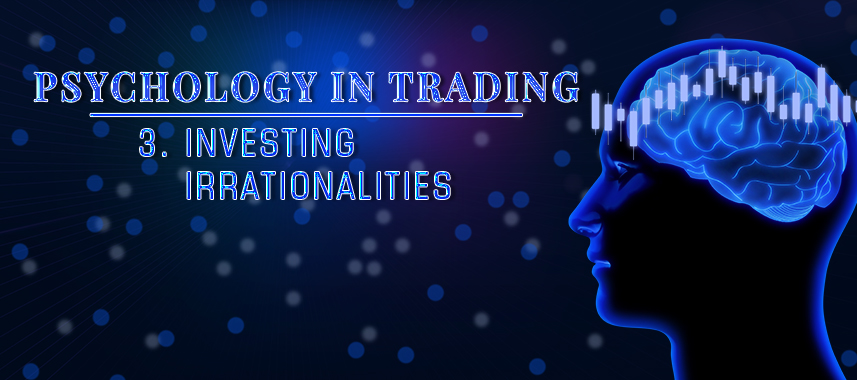
Trading and personality
4 January 2023
How to create a new habit
4 January 2023Are you a confident, calm, cautious person, or are you willing to take risks? One of the traits of your personality could, in certain situations, make you lose money whilst trading. Keeping a cool head and being rational is the ideal personality for a trader, even though we cannot always achieve this goal.
Let's see what personality is.
Personality means all the characteristics that define the way in which a person interacts and perceives the world. It is gradually modelled on our relationship to our environment, from which we received information that is implemented, memorised, interpreted and used accordingly.
It has been observed that the causes of behaviour and most personality manifestations are not only found in the environment but also in biology.
For example, studies about human temperament have shown that extroverted children are more likely to be invited to social occasions. Just like more intellectual and gifted children are more likely to choose more competitive and challenging activities.
This is true both for the more dysfunctional aspects of personality (e.g., the propensity to make risky decisions), and more functional elements, such as aptitude for study, which may also imply the influence of some neurotransmitters such as dopamine and serotonin.
It is therefore evident that a biological aspect (neurological and endocrine mechanisms present since birth, which determine the degree of emotional activation, the level of motor activity, sociability and impulsivity) of a person’s personality, alongside environmental influences (family, school, work, etc.) determine a person’s character, but in a way that is not entirely deterministic.
Personality is the result of historical and social conditions, as well as of learning and socialisation. It is an expression of a person’s desires and expectations. However, changes, albeit minor ones, do develop over time.
Knowing your personality can help you understand your limits and improve your qualities by increasing your ability to trade.
Modern studies by psychologists have focused on several successful traders, so, people who trade for a living, also succeeding in accumulating large sums in their careers, confirm that each of us, trades on his or her personality.
What is a winning personality for a trader?
Almost every great story of the excess or collapse of a financial market (just think of Lehman Brothers or Enron) has closely intertwined the narratives of collapse with stories of egotism and arrogance.
Ego and excessive pride affect most traders. I have seen people’s egos and pride get them into some horrendous trading messes, and I myself have not been immune to them in the past.
The complete opposite traits of humility and humbleness can be associated with many of the most successful traders I know. Most people with a trader’s winning personality have very low profiles. They learn from their mistakes and have a lot of respect for market risks.
One of the biggest mistakes that many traders make is to allow their trading and their beliefs or opinions about a market, to intertwine and extend their ego.
The same can be said about pride. Even though it is closely related to ego, pride is slightly different, and although it is considered a positive emotion, excessive pride (arrogance) can be a significant obstacle to successful trading. It is essential for a trader to be able to admit when he is wrong and to accept that he or she has limits and flaws.
Avoiding admitting when one is wrong, or even failing to accept that mistakes happen, can result in traders trying to exert their will over the markets, holding onto positions rather than crystallising losses.
From my own experience, traders that believe they are better than others almost never conclude things positively (I met many of these who later “disappeared”).
Another characteristic that many successful traders have is particularly low levels of anxiety. Anxiety and stress are part of trading; there is no escaping them. The very nature of trading requires one to immerse themselves in uncertainty.
Anxiety and stress affect traders in different ways and at different times. It has a distorting effect on the way we see and perceive the markets and alters our ability to make sound judgments and appropriate decisions.
Successful traders have developed various tactics that enable them to reduce anxiety levels (you have seen some of these in chapter 20). As far as I am concerned, every morning before turning on my laptop, I ride my bike for 30-40 minutes (I am lucky to be able to take a promenade seafront route, admiring a breathtaking view). Other practices that relax me are listening to music and walking with my dog in the park.
In conclusion, as Pythagoras said, “know thyself, and thou shalt know the Universe.” The first step is to discover what your personality is. In this way, you will be able to understand which aspects you have to improve in order to gain a better approach to trading.
Are you a confident, calm, cautious person, or are you willing to take risks? One of the traits of your personality could, in certain situations, make you lose money whilst trading. Keeping a cool head and
I am a macroeconomic and financial analyst with over 30 years’ experience, including two years as a fund manager. I specialise in currencies and commodities, and I am the author of several successful books on trading, macroeconomics, and financial markets.






